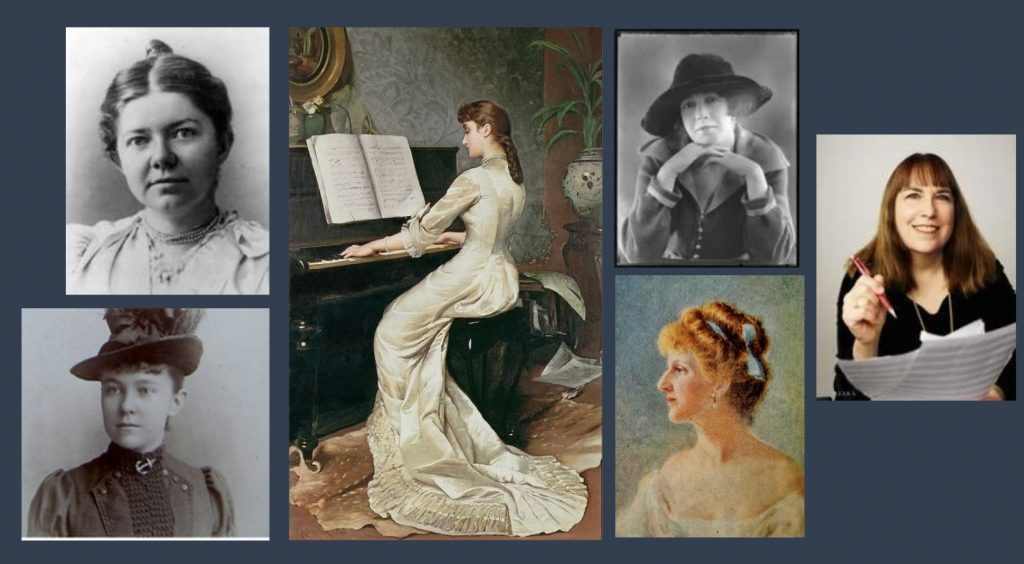To the Girl Who Wants to Compose: celebrating women composers of the 19th and 20th centuries
The Lepetit Ensemble (mezzo-soprano Ute Lepetit-Clare, mezzo-soprano Jessica Lawrence-Hares, and pianist Marie-Noelle Kendall) deliver an engaging programme celebrating women composers.

The Lepetit Ensemble, composed of mezzo-soprano Ute Lepetit-Clare, mezzo-soprano Jessica Lawrence-Hares, and pianist Marie-Noelle Kendall, deliver an engaging programme celebrating women composers, who have overcome hardships to make their individual voices heard in musical history. The composers hail from England, France, Austria, and America, determined to perform and publish their music despite frequent criticism and opposition from the predominately male establishment.
Featuring compositions by…
Poldowski, Irène Régine Wienawski (1879-1932)
Poldowski was the professional pseudonym of a Belgian-born British composer and pianist born Régine Wieniawski daughter of the Polish violinist and composer Henryk Wieniawski. Her works were highly appreciated and praised for the rare originality that proves her extraordinary creative personality.
Liza Lehmann (1862-1918)
Inspired by her studies in Germany with Clara Schumann and driven by her passion for ‘genuine’ art-song rather than Victorian ballads, Lehmann retired from singing in 1894 and turned to composition. She produced more than 350 solo and ensemble songs, many of which were well-received and widely circulated, aided by her pre-existing reputation as a singer. She is lauded by scholar Derek Hyde as one of the three ‘most outstanding women song-writers’ of the nineteenth century, alongside Maude Valerie White and Frances Allisten.
Johanna Müller-Hermann (1868-1941)
Müller-Hermann, also called Müller-Martini, was an Austrian composer who studied with Guido Adler and Zemlinsky. Although she received a good musical education, in keeping with her comfortably middle-class background, she was not allowed to progress but was trained as a teacher. Her marriage in 1893 to the Verkehrsfachmanns Otto Müller-Martini freed her to concentrate again on her music, studying piano, violin, theory and composition. Her work was performed at Vienna’s Musikverein and in evenings dedicated to women composers. In 1918, she was appointed Professor of Music Theory at the New Vienna Konservatorium. Much of her music was published by Universal Edition. Müller-Hermann left a substantial number of works ranging from songs to orchestral works. A few of these have been recorded since the 1990s.
Lori Laitman (b. 1955)
Described by Fanfare Magazine as “one of the most talented and intriguing of living composers,” Lori Laitman has composed operas, choral works, and over 300 songs, setting texts by classical and contemporary poets, including those who perished in the Holocaust. Laitman’s music is praised for its uniqueness, craft and beauty: “unmistakable sense of identity…masterful skill” (Opera News); “artistry of the highest order” (Textura.org); “gripping and thought-provoking” (American Record Guide). She’s received commissions from the BBC, The Royal Philharmonic Society, Opera America, Lyric Opera of Kansas City, Opera Colorado, Seattle Opera, Grant Park Music Festival, Music of Remembrance, Baltimore Symphony Orchestra and others. Her discography is extensive with releases on Naxos, Albany, Acis and more.
Amy Marcy Cheney Beach (1867-1944)
Known as the first female composer to have a symphony performed by a major orchestra (her “Gaelic” Symphony, premiered by the Boston Symphony Orchestra in 1896), she was also one of the first U.S. composers to have her music be recognized in Europe. A remarkable child prodigy, she made her public debut as a pianist in 1883, also the year of her first published compositions. In 1885 she performed with the Boston Symphony, but upon her marriage to the distinguished surgeon, Dr. H.H.A. Beach, she curtailed her performing in accordance with his wishes, and focused on composition. She made one performance per year, with the proceeds donated to charity, and one of these performances was of her own piano concerto with the Boston Symphony Orchestra in 1900. Following the death of her husband in 1910, she resumed performing, and toured Europe to great acclaim, performing her own music, until the onset of WWI.
Tickets
£20 General Admission, £15 Clare Hall members, £5 students.